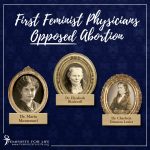| Herstory of the Week by Cat Clark |
As you can tell from the previous pages, we have been briefly investigating some of the words and actions of early feminists who opposed abortion.
Some advocates of abortion have attempted to dismiss the evidence that early feminists were pro-life, arguing, for example, that they only opposed abortion because surgery in a time prior to antibiotics was dangerous to women. Our investigation, though brief, has clearly shown that feminist opposition to abortion went much deeper. The health and safety of women was one of many inseparable concerns.
Abortion Is Inconsistent with Core Feminist Values
Many of the writers we surveyed considered abortion destructive, unjust, inhuman, or an act that violates nature. Eliza Bisbee Duffey, for example, called abortion “a sin against nature.” Regarding those who “either destroy the embryo in the womb, or cast it off when born,” Mary Wollstonecraft, author of the classic Vindication of the Rights of Woman, wrote, “Nature in everything demands respect, and those who violate her laws seldom do so with impunity.” Feminist and novelist Eleanor Kirk called abortion a “work of destruction.” Because abortion is, according to the first female presidential candidate Victoria Woodhull, not “in accordance with the law of justice it will come home to its subject and be repaid with all its accumulated mass of inhumanity.” In other words, early feminists considered abortion inconsistent with feminist values like justice and nonviolence.
Abortion Harms Women and Society
Not surprisingly, then, abortion was frequently regarded as a symptom of injustice, the objectification and exploitation of women, or other social disorders. It was likewise understood as unjust, dangerous, or degrading to women, and harmful to society as a whole. “When a man steals to satisfy hunger,” Mattie Brinkerhoff wrote, “we may safely conclude that there is something wrong in society — so when a woman destroys the life of her unborn child, it is an evidence that either by education or circumstances she has been greatly wronged.” In describing Dr. Charlotte Lozier’s refusal to perform abortion, abortion was called “foulest wrong committed against [women].” Woodhull wrote that “no woman can practice this crime without in part destroying her own life,” and presented abortion as demoralizing and ultimately fatal for all human society. Dr. Elizabeth Blackwell, the first woman to receive a medical degree from an American medical school, wrote that providing abortions “was an utter degradation of what might and should become a noble position for women,” i.e. the profession of physician.
Feminists Called Abortion Feticide
Woodhull, as we have seen, wrote that “the rights of children, then, as individuals, begin while they yet remain the fœtus.” Early feminists opposed abortion not only because it was dangerous to women, but also because abortion kills children. Sarah Norton, who together with Susan B. Anthony agitated for the admission of women to Cornell University, called it “foeticide” and “ante-natal child murder,” and wrote of “the right of the unborn to be born.” Brinkerhoff called abortion “infanticide” and said it “destroys the life of [a woman’s] unborn child.” Kirk likewise referred to abortion as a form of “infanticide” in which “the murderer pockets his big fee, and keeps on his work of destruction.” Paulina Wright Davis, an editor for Anthony’s newspaper The Revolution, called abortion “murder of the innocents.” “After a child is, no one has a right to tamper with its existence,” wrote Duffey, who called abortion “murder.” Woodhull too called abortion “murder” and “a slaughter of the innocents.”
Early Abortions Also Condemned
“From the moment of conception, the embryo is a living thing, leading a distinct, separate existence from the mother, though closely bound to her,” wrote Duffey. “[T]here is no time in the whole process of the growth of the human body from the moment of conception until death, that pulsations of life are not present,” Woodhull agreed.
For this reason, early feminist condemnation of abortion included not only procedures performed late in pregnancy, but also abortifacient medicines designed to induce early abortion. Norton wrote, “[C]irculars are distributed… recommending certain pills and potions for the very purpose, and by these means the names of these slayers of infants, and the methods by which they practice their life-destroying trade, have become ‘familiar in our mouths as household words.’” Anthony’s newspaper, The Revolution, had a known policy that “no quack or immoral advertisements [for patent medicines] will be admitted” because “Restellism [a period term for abortion] has long found in these broths of Beelzebub, its securest hiding place.” Writing about the Revolution’s policy, editor Parker Pillsbury called “quack medicine” venders “Foeticides and Infanticides” who “should be… regarded with shuddering horror by the whole human race.” Duffey held that “every maker, advertiser and seller of patent medicines, warranted to remove ‘female obstructions,’ should be subjected to prosecution and punishment…. [Because] their real intent is for the procurement of abortion, and so everybody knows.”
Creating Solutions
Because abortion was understood as destructive, a violation of nature, a symptom of injustice, dangerous and degrading to women, and a form of killing, the early feminists we surveyed believed that the problem of abortion should be addressed at its root causes. Holistic solutions should include education, securing women’s rights, resources, and support. Duffey wrote that “the surest preventative against this crime will be a thorough teaching to women, even before marriage, of the physiology, hygiene, duties and obligations of maternity,” and that women should be told “the how and the why of the whole matter, and they will discover the wrong themselves, and feel the full force of it, far more than they ever can by taking it merely on the say-so of men.” Brinkerhoff noted: “the question now seems to be, how shall we prevent this destruction of life and health? Mrs. [Elizabeth Cady] Stanton has many times ably answered it — ‘by the true education and independence of woman.’” Woodhull and Claflin agreed with Brinkerhoff and Stanton: “[W]hile we shall at all times freely discuss the matter, objectively as to its results, we shall not forget to look at the matter subjectively, to find the remedy, which, if we mistake not, is in granting freedom and equality to woman.” Kirk believed women’s rights and the rights of the unborn were linked, and envisioned a hopeful future where educated women have political clout to protect the unborn. Dr. Lozier, while refusing to perform an abortion, “pitied and tenderly cared for the [woman]” and “proffered to the young woman any assistance in her power to render.”
Jane Addams, for whom peace was “[not] an absence of war, but the unfolding of world-wide processes making for the nurture of human life,” was presented in this series as an exemplar of activism dedicated to creating holistic solutions to the challenges faced by real people. The key to Jane Addams’ success as a social justice activist was working to address real people’s problems at their roots. The best way to approach any human problem, she believed, was to approach people actively and sympathetically, learn to understand the challenge or difficulty from their perspective, and use that knowledge to address the problem’s root causes.
Living the Legacy of Pro-Life Feminism
Feminists for Life recognizes that abortion is a reflection that our society has failed to meet the needs of women. We promote the practical resources and support women want and need to make nonviolent choices, and our own efforts are shaped by the core feminist values of justice, nondiscrimination, and nonviolence.
“While we would be pro-life feminists whether or not the early American feminists opposed abortion,” said Feminists for Life President Serrin Foster, “we are proud to continue their legacy. By giving birth to new solutions, Feminists for Life builds on the foundation they created. We are working to realize their unfulfilled vision for the world.”
Recommended reading:
The author of this series is grateful for the research and assistance provided by Mary Krane Derr, co-editor with Rachel MacNair and Linda Naranjo-Huebl of ProLife Feminism Yesterday & Today: Expanded Second Edition(Xlibris, 2005).







